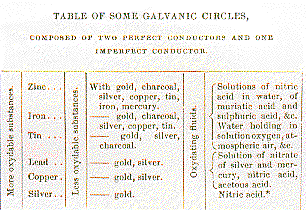 |
 |
 |
 |

Although Davy's most significant achievements were scientific -- he discovered the elements potassium, sodium, barium, strontium, calcium, and magnesium; invented the safety lamp; and published important work on nitrous oxide (laughing gas), respiration, agriculture, and electromagnetism -- his interests ranged even more widely. He wrote poetry, and met both Coleridge and Southey in the 1790s at Clifton, a spa near Bristol. In 1803 he was admitted to the Royal Society as a fellow, becoming its secretary in 1807 and its president in 1820. An account from the generation after this period testifies to his signal importance in the life of that institution. Late in life he extended his attention somewhat from science to encompass travel writing and rural sports, publishing a work on fly-fishing.
William Godwin knew Davy well, and in the early 1800s the scientist was a frequent guest at his home. How well Mary in her childhood would have understood Davy's prominence is not known, but as a family name his scientific advances could not but attract her later attention. The same can be said for the youthful Shelley, who was fascinated with chemical experimentation and a keen student of modern science. It is safe to say that from 1805 to 1825 there was no greater scientist practicing in England.